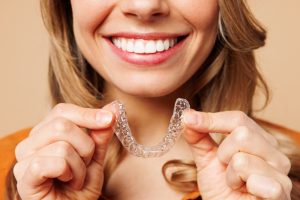Fruit juice can be a great snack for kids and adults alike because of its nutritional value that’s better than soda or drinks with added sugar.
But did you know that fruit juice and teeth are not the best combination for your oral health?
Our staff will take a look at whether fruit juice or whole fruit is better for your teeth.
Does fruit juice damage my teeth?
Yes, fruit juice has the potential to damage your teeth because the acid in fruit juice can weaken your tooth’s outer layer of enamel. A study in 2009 done by the Eastman Institute for Oral Health at the University of Rochester determined that orange juice decreased the hardness of enamel by as much as 84 percent.
As a result of the study, researchers suggested that people who sip their fruit juice for longer periods of time are more likely to have tooth erosion due to weaker enamel. It’s also important to practice regular oral hygiene habits, like brushing and flossing twice daily.
Do fruits damage teeth as much as fruit juice?
Yes, whole fruits have the same potential to damage your teeth as fruit juice. The acidity of fruit juices doesn’t vary much from the fruits themselves. For example, apple juice typically ranges in pH from 3.35 to 4.00, while whole apples (depending on the variety) range from 3.33 to 3.9 in pH. Florida oranges have a pH range of 3.69 to 4.34, while Florida orange juice is more acidic with a pH going from 3.30 to 4.19 (the higher the pH, the less acidic something is).
The main difference between juice and whole fruits is that juice has a greater potential to settle into hard-to-reach areas of your mouth, like in between teeth or into already-existing cavities. Whole fruits have fiber and bigger pieces that you can remove more easily.
Make sure to read fruit juice labels carefully. Some fruit juices add sugar, which increases the acidity of the drink and can accelerate tooth erosion and decay.
How many whole fruits are in one cup of juice?
Another thing to consider is how many whole fruits go into making juice. Juice is a more highly concentrated form of whole fruits. It takes three apples and three oranges to make one cup (8 fluid ounces) of their respective juices. One cup is one serving of juice. Having just one fruit as a serving gives you less total acid in one serving compared to juice.
However, the acidity remains the same. With whole fruits, you’re just getting less of the concentrated juice.
How can I still enjoy my favorite fruits without having them affect my teeth?
Fruits are still highly nutritious parts of our diet, and you can still enjoy them every day. Eat fruits as part of a larger meal, such as adding strawberries and blueberries to a salad, chopping up an apple as a side dish, or adding fruits to oats and yogurt for a parfait. Having added foods with fruits will reduce the concentration of the acid while increasing the action of saliva to clear out bits of fruit in between your teeth.
What fruits are the most acidic?
The most acidic fruits include:
- Lemons
- Limes
- Plums
- Grapes
- Grapefruits
- Blueberries
- Oranges
- Peaches
- Tomatoes
Please consume these fruits with other foods, like on a salad. The fibrous movement of the greens in a salad can help remove bits of food and lessen the impact of acid on your teeth.
Who can help me with oral hygiene tips in Springfield, Missouri?
Talk to the staff at Parkcrest Dental Group. We’re happy to help you in any way we can.




